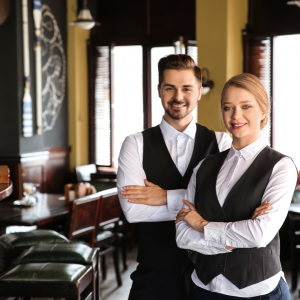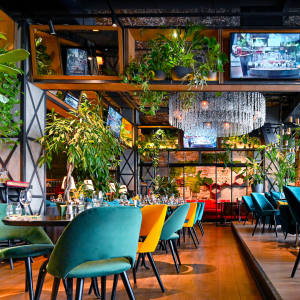The costs and considerations in starting a food business in Singapore
Most Singaporeans do not plan on working as a company employee for the entire duration of their career. At some point in their working lives, the idea of venturing out on their own, to be their own boss will have crossed their minds. In fact, it would not be a stretch to say that it is the dream of many to have one’s own business. Whether it is starting an e-commerce retail business, a services business start-up or a conventional brick-and-mortar shop, the appeal of pursuing one’s personal interests and be in charge of one’s working hours is a tempting prospect. Some may be more fortunate than others in realising their dreams earlier. Some may ultimately never fulfil this dream. Yet many more may realise that starting and owning a business is more than meets the eye. Beyond being a fulfilment of a lifelong personal ambition, it also involves the mundane reality of finances, regulations and other commercial considerations.
Being a nation of foodies, there are many Singaporeans who harbour a wish to own their own café or restaurant one day. After all, many Singaporeans, besides loving to eat, also love to cook. There would be some who will be fortunate enough to inherit a food and beverage (F&B) business from their family or buy over one which is already well established and successful. There is, of course, also the option of being a franchisee, but most people who venture into the F&B industry would usually prefer to strike out on their own. They are likely to have little to no experience in the industry and will be starting from scratch. So for an outsider looking in, what are the financial and business issues that a new F&B business entrepreneur needs to be mindful of?
THE REALITIES OF THE F&B INDUSTRY
Before we talk about the financials and other issues involved in starting an F&B business, it would be useful to, first, take note of the realities of the industry. An average small-scale F&B business operates at an annual loss of 8% and 40% of these businesses do not survive beyond the first five years. In fact, one in three F&B businesses are replaced every year. Singapore’s competitive F&B landscape is such that, on a per capital basis, Singapore has twice as many F&B businesses as Hong Kong. Such intense competition invariably means it takes a considerable amount of time to recoup the initial capital (about 30 months). It also makes it harder to attract staff: The F&B industry has a 5.4% job vacancy rate, the highest across all industries.
COOK UP A PLAN
The starting point of a business is to have a business plan right at the beginning. It always pays to plan and know what you have to do, so take your time in considering all aspects as well as you can. Your business plan should include components such as type of business, targeted clientele, desired location, financial projections, budgeting, marketing strategy, pricing plan, operations, suppliers list, hiring policies, service standards, etc. It may not be possible to conceptualise everything at one go but do take some time to think things through. Also, think about setting aside some contingency funds for unexpected events. Think of plausible scenarios of events that could go wrong, and which you may need to be ready for.
It takes a lot of capital to start up an F&B business in Singapore. This is due to high rental rates, renovation costs, equipment costs, labour costs, among others, in Singapore. You need to figure out where your money is going to come from, whether this is through savings, loans or most likely, a combination of both. You also need to have enough cash as reserves and operating capital. It would be advisable to have at least a few months of pure overhead expenses as reserves.
THE COSTS OF A SHOP FRONT
The largest cost component of an F&B business is likely to be rental and the associated costs in renovation. Ideally, rent should be about 10% of total revenue, but this is very unlikely as rentals are always moving up, and a spot in a prime location will cost a hefty sum. For areas in the Central Business District such as Boat Quay or Robinson Road area, the current going rate for a ground floor shop house unit is around S$10psf (per square foot), so a small shop space of 1000 square feet will cost about S$10,000 a month. Even in light of the trend towards setting up shop in residential areas, taking the Ang Mo Kio area as an example, the lowest monthly rental still comes in over the S$5,000 mark. So in considering footfall and the desired clientele pool for your type of food business, while the lease for a storefront in a sought-after area will improve your odds for early success, the rental costs will also substantially add to your cost burdens.
Next, successfully renting a unit only brings you to the next big financial decision: Renovation. It takes work to turn an empty shop space into a restaurant or café. You will have to pay for new light fixtures, cabinets, decorations and furniture. A rough gauge may involve an expenditure of around $100 – $120 per square foot. Hence, for a 1000 square feet restaurant or café, this could mean a cost of around $100,000 – S$120,000 on renovations and furniture. Further to this, there is also kitchen installations like coolers, freezers, stoves, ovens and refrigerated display shelves to install. These assorted kitchen equipment may cost upwards of S$50,000. Beyond these expenditure, there may be other factors to consider.
First, if you are taking over the unit from another tenant, there will usually be a takeover fee which can be a sizeable amount. Secondly, leases in Singapore are usually not very long, lasting about two to three years normally. There is the challenge to recover your cost within the short timeframe and a risk of the landlord increasing your rental substantially for a new lease term. While experienced F&B owners may try to negotiate for a rent-rise cap, new cafe owners do not usually have the bargaining power to do so. Thirdly, rental usually involves a certain commitment period, dependent on the landlord. The norm is a minimum of 6 months, so do take that into consideration on securing your location. Lastly, should you decide to move out of the premise at the end of the contract, there may be a restoration fee to pay to restore the space to its original state.
LICENSE TO COOK
Like most other businesses in Singapore, to operate an F&B business here, you may need to fulfill a myriad of requirements and acquire a number of licenses. While not all licenses will apply to all F&B businesses, it is important to look at your business plan and figure out which are the necessary licenses for you. There are a few that are compulsory for all F&B businesses, while others only apply to a specific type of F&B. Some of the licenses that an F&B business is required to have include:
- Company Registration – All F&B businesses must be registered as a business with the Accounting & Corporate Regulatory Authority (ACRA). The application is usually processed within the day after payment of the name application fee. It may take between 14 days to 2 months if the application needs to be referred to another agency for approval or review. Fees to be paid include the name approval fee and application fee.
- Employee CPF – All F&B businesses with employees need to register with the Central Provident Fund (CPF) for employee contributions. The process can be done online and registration does not require any fees.
- Food Shop License – Issued by the Singapore Food Agency (SFA), all food establishments must procure this license before they can operate. The application and approval process can take a week to a few months.
- Basic Food Hygiene Certificate/Food Hygiene Officer Certificate – The Basic Food Hygiene Certificate is required for all food handlers in a food establishment, these include chefs, sous chefs, cooks and kitchen assistants. All food handlers must go through a basic food hygiene course, which consists of six hours of course work and one-and-a-half hours of assessment. Subsequently, all certified food handlers must be registered with SFA. Likewise, a Food Hygiene Officer (FHO) is required to oversee and implement effective food hygiene measures which ensure food is prepared in a safe and hygienic manner. The 3.5 day Conduct Food & Beverage Hygiene Audit course is required for an FHO.
Beyond these basic requirements, other certificates that may be required for a restaurant/café may include the following:
- Licenses for Import of Foods – There are separate licenses required for the import of meats, fresh fruits and vegetables, eggs and processed food products. These are also obtained from the SFA.
- Halal Certification – If you wish to serve Muslim customers, you will require a Halal Certification from MUIS, specifically under the Eating Establishment (EE) Scheme which issues Halal licenses to retail food establishments such as restaurants, snack bars and other food retail establishments.
- Liquor License – A Liquor License will need to be obtained from the Singapore Police Force if you intend to sell liquor in your restaurant.
THE COSTS OF OPERATIONS
During operations, the restaurant will incur monthly operational costs (outside of rental) on a recurrent basis, these will include cost of paying utilities (gas, electricity and water – estimate of about $1,000 a month), staff costs (deviates according to the size of establishment, but a typical service staff salary would be around $2,000, while an average chef may make about $3,000 a month), food ingredients and inventory, marketing and promotion expenses, etc.

OTHER MISCELLANEOUS ITEMS
There are other things to take note of over and above the licenses and costs associated with opening a food retail shop listed previously. A couple of other items to consider include the following:
- Pest control contract – Covering the control of rodents, cockroaches and flies during the licensing period. The inspection frequency of the food shop premises covered in the contract shall be at least once a month to detect any sign of pest infestation. This document may also be needed during the application for a Food Shop License.
- Fire License – The owner of the property should have a current fire certificate from the Singapore Civil Defence Force (SCDF) which certifies that the property meets basic fire safety standards. These certificates are renewed annually following SCDF inspections. Failure to have one for any building which requires one is an offence for which the owner or occupier can be prosecuted. The owner may not have a fire certificate if the premise was not used as a restaurant previously. If there is no current fire certificate, insist that the landlord obtain one at its own expense as a pre-condition to you signing the tenancy agreement. If the landlord insists that you do so instead, factor the time and cost of doing so into the negotiations on the rent. Obtaining a fire certificate can take several months and a temporary fire permit or fire safety certificate can be obtained in the interim.
SEEK ADVICE FROM PROFESSIONALS
The costs and considerations listed in this article may not be comprehensive and there may be other matters not covered here. This article only serves as a rough guide on the things to consider and do and if in doubt, do engage a professional consultant or experienced insider in the F&B industry for advice. It is always better to have a clear idea on what a new venture entails before coming in. Dreams may come true, but reality requires a lot of hard work.











